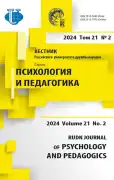The Images of Russia and the Russian World among the Russian Diaspora in Kazakhstan and Kyrgyzstan
- Authors: Kuznetsova Y.S.1
-
Affiliations:
- HSE University
- Issue: Vol 21, No 2 (2024)
- Pages: 556-586
- Section: IDENTITY, MIGRATION AND INTERCULTURAL RELATIONS IN THE POST-SOVIET SPACE
- URL: https://journal-vniispk.ru/2313-1683/article/view/326306
- DOI: https://doi.org/10.22363/2313-1683-2024-21-2-556-586
- EDN: https://elibrary.ru/LKCKVM
- ID: 326306
Cite item
Full Text
Abstract
Currently, the Russian world potentially is a new unifying, communication and civilizational factor not only within Russia, but also beyond its borders, in the post-Soviet space. The Russian diaspora is a part of the Russian world and can act as its successor and translator; therefore, this study is devoted to the images of the Russian world and Russia (as the country from which the Russian world takes its origins) among Russians in the post-Soviet space (using the example of countries such as Kazakhstan and Kyrgyzstan). The study sample included 71 members of the Russian diaspora living in Kyrgyzstan (41 people) and Kazakhstan (30 people); the methodological tools included: the open-ended question method, associative method and scaling. It was found that the majority of the respondents felt a sense of belonging to the Russian world to one degree or another; in general, they evaluated it positively; there was a predominance of positive feelings towards the Russian world, but anxiety was also present. For the overwhelming majority of the respondents, the subjective boundaries of the Russian world either ran through the post-Soviet space or were absent at all. Specific differences could be observed: in the chronological chain ‘Ancient Rus - Tsarist Russia - The Russian Empire - The USSR - Russia’ different links were displaced depending on the historical relations of Russia with the countries where the Russian diaspora lived. Compared to the Russians from Kazakhstan, the Russians from Kyrgyzstan noted that in the time perspective of the Russian world there could be not only the past and the present, but also the future; they also had such categories as ‘time’, ‘unification’ and ‘religion’, which testified to the potential of the Russian world as a unifying factor between Russia and, accordingly, Kyrgyzstan. Some members of the Russian diaspora did not have answers to this or that question about the Russian world, which might indicate indifference or lack of understanding of it, and therefore the need for competent development of the idea of the Russian world on the part of social and political institutions.
About the authors
Yulia S. Kuznetsova
HSE University
Author for correspondence.
Email: usy8991@gmail.com
ORCID iD: 0009-0007-0496-405X
SPIN-code: 9045-6323
PhD student in Psychology
20 Myasnitskaya St, 101000 Moscow, Russian FederationReferences
- Anderson, B. (2001). Imagined communities. Reflections on the origin and spread of nationalism. Moscow: KANON-press-Ts, Kuchkovo pole. (In Russ.)
- Batanova, O.N. (2009). The Russian world and the problems of its formation. Ph.D. in Political science Thesis. Moscow: Russian Academy of Public Administration under the President of the Russian Federation. (In Russ.)
- Berger, P.L., & Luckmann, T. (1995). The social construction of reality. A treatise in the sociology of knowledge. Moscow: Medium. (In Russ.)
- Deyneka, O., & Dauksha, V. (2014). The image of the Belarusian State in students’ consciousness during the recent financial crisis. In C. Pracana (Ed.). Psychology Applications & Developments. Advances in Psychology and Psychological Trends Series (pp. 272–281). Lisboa: InScience Press.
- Eremina, N.V., Konfisakhor, A.G., & Solonnikov, D. V. (2018). «Identity» factor in development of geo-civilizations. Sociodynamics, (3), 45–63. (In Russ.) https://doi.org/10.25136/2409-7144.2018.3.25672
- Huntington, S.P. (2003). The Clash of Civilizations and the Remaking of World Order. Saint Petersburg: AST. (In Russ.)
- Khasanov, A.K. (1977). Popular movements in Kyrgyzstan during the period of the Kokand Khanate. Moscow: Nauka Publ. (In Russ.).
- Khrenov, N.A. (2021). Between America and China: the concept of the “Other” in the formation and transformation of Russia’s civilizational identity (beginning). Kul'tura kul'tury, (1). 6. (In Russ.)
- Kondakov, I.V., Sokolov, K.B., & Khrenov, N.A. (2011). Civilizational identity in the Transitional era: cultural, sociological and art historical aspects. Moscow: Progress-Traditsiya. (In Russ.)
- Kozlovtseva, N.A. (2017). The "Russian world" as a theoretical concept in the modern social and humanitarian knowledge. Observatory of Culture, 14(3), 284–292. (In Russ.) https://doi.org/10.25281/2072-3156-2017-14-3-284-292
- Mitina, O.V., & Petrenko, V.F. (2009). Psychosemantic analysis of state image: reconstruction and measuring. Psychological Journal, 30(3), 16–27. (In Russ.)
- Modrzhinskaya, E.D. (1977). Cosmopolitanism. In A.M. Prokhorov (Ed.). The Great Soviet Encyclopedia (Vol. 27, p. 256). Moscow: Sovetskaya entsiklopediya. (In Russ.)
- Moscovici, S. (2001). Social Representations: Essays in Social Psychology. New York: New York University Press.
- Pen'kova, E.A. (2012). The Russian World as a factor of social identification of Russian youth. Ph.D. in Sociology Thesis. Moscow: Russian State Social University. (In Russ.)
- Petukhov, V.V., & Barash, R.E. (2014). The Russians and the «Russian World»: the historical context and the contemporary interpretation. Polis. Political Studies, (6), 83–101. (In Russ.) https://doi.org/10.17976/jpps/2014.06.07
- Pishcheva, T.N. (2011). Political images: problems of investigation and of interpretation. Polis. Political Studies, (2), 47–52. (In Russ.)
- Rashid al-Din. (1952). Collection of Chronicles (vol. 1, book 1). Moscow: Publishing House of the Academy of Sciences of the USSR. (In Russ.).
- Tajfel, H., & Turner, J.C. (2004). The social identity theory of intergroup behavior. In J.T. Jost, J. Sidanius (Eds.). Political Psychology: Key Readings (pp. 276-293). New York, NY: Psychology Press. https://doi.org/10.4324/9780203505984-16
- Zhade, Z.A. (2007). Russia's Geopolitical identity in the context of globalization. Doctorate in Political science Thesis. Krasnodar: Kuban State University. (In Russ.)
Supplementary files









